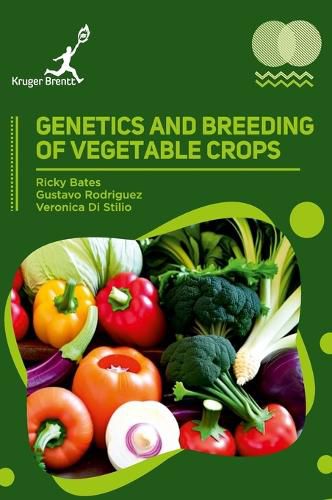Readings Newsletter
Become a Readings Member to make your shopping experience even easier.
Sign in or sign up for free!
You’re not far away from qualifying for FREE standard shipping within Australia
You’ve qualified for FREE standard shipping within Australia
The cart is loading…






This title is printed to order. This book may have been self-published. If so, we cannot guarantee the quality of the content. In the main most books will have gone through the editing process however some may not. We therefore suggest that you be aware of this before ordering this book. If in doubt check either the author or publisher’s details as we are unable to accept any returns unless they are faulty. Please contact us if you have any questions.
Principles of Genetics in Vegetable Crops: Provide a comprehensive overview of genetic principles relevant to vegetable crops, including Mendelian genetics, gene function, genetic variation, inheritance patterns, and the role of genetic mutations and recombination.
Breeding Techniques and Strategies: Explore various breeding techniques and strategies used in vegetable crop improvement, including traditional breeding methods (selection, cross-breeding), modern techniques (marker-assisted selection, genetic modification), and innovative approaches (CRISPR/Cas9 gene editing).
Genomic Tools and Technologies: Discuss the application of genomic tools and technologies in vegetable crop breeding, including DNA sequencing, genome-wide association studies (GWAS), quantitative trait locus (QTL) mapping, and the use of bioinformatics to analyze genetic data.
Disease and Pest Resistance: Examine strategies for developing disease and pest-resistant vegetable crops, including the identification of resistance genes, incorporation of resistance traits through breeding, and the use of integrated pest management (IPM) approaches.
Sustainable Practices and Future Trends: Explore sustainable breeding practices and future trends in vegetable crop genetics, including the focus on organic breeding, conservation of genetic resources, climate-resilient crops, and the role of biotechnology in addressing global food security challenges.
$9.00 standard shipping within Australia
FREE standard shipping within Australia for orders over $100.00
Express & International shipping calculated at checkout
This title is printed to order. This book may have been self-published. If so, we cannot guarantee the quality of the content. In the main most books will have gone through the editing process however some may not. We therefore suggest that you be aware of this before ordering this book. If in doubt check either the author or publisher’s details as we are unable to accept any returns unless they are faulty. Please contact us if you have any questions.
Principles of Genetics in Vegetable Crops: Provide a comprehensive overview of genetic principles relevant to vegetable crops, including Mendelian genetics, gene function, genetic variation, inheritance patterns, and the role of genetic mutations and recombination.
Breeding Techniques and Strategies: Explore various breeding techniques and strategies used in vegetable crop improvement, including traditional breeding methods (selection, cross-breeding), modern techniques (marker-assisted selection, genetic modification), and innovative approaches (CRISPR/Cas9 gene editing).
Genomic Tools and Technologies: Discuss the application of genomic tools and technologies in vegetable crop breeding, including DNA sequencing, genome-wide association studies (GWAS), quantitative trait locus (QTL) mapping, and the use of bioinformatics to analyze genetic data.
Disease and Pest Resistance: Examine strategies for developing disease and pest-resistant vegetable crops, including the identification of resistance genes, incorporation of resistance traits through breeding, and the use of integrated pest management (IPM) approaches.
Sustainable Practices and Future Trends: Explore sustainable breeding practices and future trends in vegetable crop genetics, including the focus on organic breeding, conservation of genetic resources, climate-resilient crops, and the role of biotechnology in addressing global food security challenges.